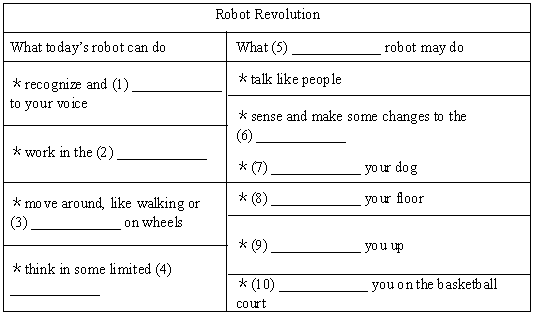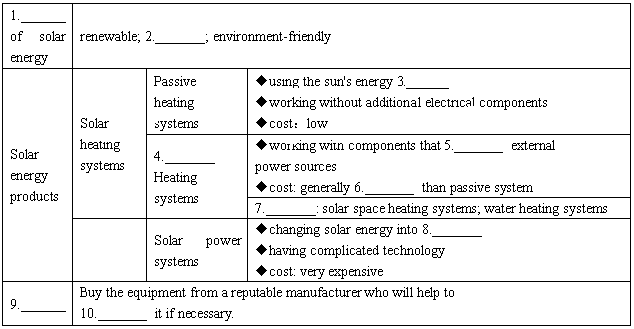

科目:高中英语 来源:安徽省模拟题 题型:阅读理解
| 任务型读写。阅读下面短文,根据所读内容在表格中的空白处填入恰当的单词。 注意:每个空格只填一个单词。 | ||||||||||
| In a memory-based competition between you and a chimp (猩猩); who do you think would win? If you put yourself on top, you might want to guess again. In a test that challenged participants to remember numbers, a young chimp performed better than Japanese college students. Here's how the test worked. At Kyoto University in Japan, human students and chimpanzee participants sat in front of a computer. Five numbers, ranging from 1 to 9,were combined with one another and then, they appeared at random places on the screen. The numbers stayed on the screen for less than a second. In the first test, for example, participants saw the numbers for 650 milliseconds (about two-thirds of a second). Then, each number disappeared and they saw a white square instead. Participants had to touch the squares in numerical order, based on the numbers that had been there a moment before. In this test, the students touched the boxes in the correct order about 80 percent of the time. A young chimp named Ayumu performed equally well. During a harder test, participants were only able to see the numbers for 210 milliseconds. This time, students only succeeded in putting the boxes in the correct order about 40 percent of the time. But Ayumu still could select the boxes in the right order nearly 80 percent of the time. Some people have what's called a "photographic memory," which allows them to remember a surprising number of details after just a quick glimpse of something. Ayumu's memory might work in a similar way, says lead researcher Tetsuro Matsuzawa. The chimp's young age might have something to do with his impressive perfomance, too. In previous tests, the Japanese researchers found that young chimps perfomed better than their mothers. The scientists are interested to see whether Ayumu loses his strong memory as he gmws older. They already know that young children sometimes have sharp memories when offered something photographical, but they lose this ability over time. | ||||||||||
|
查看答案和解析>>
科目:高中英语 来源:江苏高考真题 题型:阅读理解
| 任务型阅读。请认真阅读下列短文,并根据所读内容在文章后表格中的空格里填入一个最恰当的单词。注意:请将答案写在相应题号的横线上。每个空格只填1个单词。 | |||||||||||
| For more than twenty years scientists have been seeking to understand the mystery of the "sixth sense" of direction. By trying out ideas and solving problems one by one, they are now getting closer to one answer. One funny idea is that animals might have a built-in compass (指南针). Our earth itself is a big magnet (磁体). So a little magnetic needle that swings freely lines itself with the big earth magnet to point north and south. When people discovered that idea about a thousand years ago and invented the compass,it allowed sailors to navigate (航海) on ocean voyages, even under cloudy skies. Actually the idea of the living compass came just from observing animals in nature. Many birds migrate twice a year between their summer homes and winter homes. Some of them fly for thousands of kilometers and mostly at night. Experiments have shown that some birds can recognize star patterns. But they can keep on course even under cloudy skies. How can they do that? A common bird that does not migrate but is great at finding its way home is the homing pigeon. Not all pigeons can find their way home. Those that can are very good at it, and they have been widely studied. One interesting experiment was to attach little magnets to the birds' heads to block their magnetic sense-just as a loud radio can keep you from hearing a call to dinner. On sunny days, that did not fool the pigeons. Evidently they can use the sun to tell which way they are going. But on cloudy days,the pigeons with magnets could not find their way. It was as if the magnets had blocked their magnetic sense. Similar experiments with the same kind of results were done with honeybees. These insects also seem to have a special sense of direction. In spite of the experiments,the idea of an animal compass seemed pretty extraordinary. How would an animal get the magnetic stuff for a compass. An answer came from an unexpected source. A scientist was studying bacteria that live in the mud of ponds and marshes. He found accidentally little rod-like bacteria that all swam together in one direction-north. Further study showed that each little bacterium had a chain of dense particles inside,which proved magnetic. The bacteria had made themselves into little magnets that could line up with the earth's magnet. The big news was that a living thing,even a simple bacterium, can make magnetite. That led to a search to see whether animals might have it.. By using a special instrument called magnetometer, scientists were able to find magnetite in bees and birds, and even in fish. In each animal,except for the bee. The magnetic stuff was always in or closer to the brain. Thus the idea of a built-in animal compass began to seem reasonable. | |||||||||||
|
查看答案和解析>>
科目:高中英语 来源:0110 期中题 题型:阅读理解
Solar energy application 
查看答案和解析>>
科目:高中英语 来源:0111 月考题 题型:完形填空
| 完形填空。 | ||||
| In schools all over the world boys and girls are learning foreign languages. 1 knows his own language, but 2 is very useful, especially when we travel to other countries. If we go to France, we ought to be able to speak 3 , and in Germany people will 4 us to understand German. How many languages are there in the world? There are about fifteen hundred, but many of them are not very 5 . English is one of the most important languages 6 so many people use it, not only in England and the USA, 7 in other parts of the world. More than 200,000,000 speak it 8 their own language, and about another 200,000,000 use it as a second language. It is 9 to say how many people are learning it. Many millions of school boys and school girls are trying to do so. English children study French, which is also a very 10 language. An Englishman can 11 find someone in almost all parts of the world who is able to talk to him in either English or 12 . Which is the best way to learn a language? We should remember that we all learnt our own language well when we were children. If we could learn a second language in the same way, it would not seem so 13 . Think of what a child 14 . It listens to what people say, and it tries to imitate (模仿) what it hears. When it wants something, it 15 ask for it. It is 16 the language, talking in it, and thinking in it all the time. If people had to use a second language all the time, they would learn it quickly. 17 is also important to remember that we learn our own language by hearing people speak it, not by seeing 18 they write. We imitate (模仿) what we hear. In school, 19 you learn to read and write as well as to hear and speak, it is 20 to learn all the new words first through the ear. You can read them, spell them, and write them later. | ||||
|
查看答案和解析>>
科目:高中英语 来源:河北省期末题 题型:阅读理解
查看答案和解析>>
科目:高中英语 来源:0119 期中题 题型:阅读理解
查看答案和解析>>
科目:高中英语 来源:0115 期中题 题型:阅读理解
查看答案和解析>>
科目:高中英语 来源:0124 月考题 题型:阅读理解
查看答案和解析>>
湖北省互联网违法和不良信息举报平台 | 网上有害信息举报专区 | 电信诈骗举报专区 | 涉历史虚无主义有害信息举报专区 | 涉企侵权举报专区
违法和不良信息举报电话:027-86699610 举报邮箱:58377363@163.com